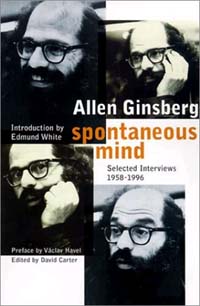 |
|
Spontaneous Mind: Selected Interviews 1958-1996 by Allen Ginsberg; With a Preface by Václav Havel and an Introduction by Edmund White; Edited by David Carter; HarperCollins; 603 pages; $40.00.  The Roman author Horace, writing at the start of the Common Era, called
poets the world's "first instructors." Eighteen hundred years later the Englishman Percy
Bysshe Shelley echoed his ancient predecessor when he wrote that poets were
"the unacknowledged legislators of the world'.
The Roman author Horace, writing at the start of the Common Era, called
poets the world's "first instructors." Eighteen hundred years later the Englishman Percy
Bysshe Shelley echoed his ancient predecessor when he wrote that poets were
"the unacknowledged legislators of the world'.
Both poets could have been writing about Allen Ginsberg (1926-1997), whose life and works touched virtually every political and social movement of the second half of the 20th Century. Perhaps the greatest American poet since Walt Whitman, Ginsberg's Howl and Kaddish broke all the bounds of subject and structure and inspired generations of poets and activists alike. Thanks to Ginsberg's efforts, the Beat Generation evolved from a cadre of friends to a major literary movement. Though Ginsberg's contributions to literature cannot be denied, his most important (and still controversial) service to the world was his lifelong crusade for freedom: freedom to think, to express oneself, and to experiment with various forms of drugs, sex and political ideas. Students in Prague, intellectuals in Havana, antiwar activists in Chicago and gays in New York all looked to Ginsberg for inspiration and support, just as their efforts inspired Ginsberg to further achievements. Václav Havel, the former student activist who is now the President of the Czech Republic- and who wrote the preface to Spontaneous Mind--is not the only activist whose life was touched by the presence of Allen Ginsberg. Ginsberg's genius for self-expression and self-promotion was most evident when he talked to others, both in the give-and-take of personal conversation and in the more formal and public communication of an interview. "Ginsberg considered the interview as an art form, as well as an opportunity to get his message across to many people, which, as a student of Eastern religions, he believed was his spiritual obligation," wrote author Edmund White, in his Introduction to Spontaneous Mind.
The first interview, by Marc D. Schleifer, was published in The Village Voice and the last interview, by Steve Silberman, appeared on-line in www.HotWired.com. In between are interviews from City Lights Journal, The Paris Review, Firing Line, Playboy, Gay Sunshine, Oui and Chronicles. A reader can read Spontaneous Mind from cover to cover or s/he can go right to the subjects and venues that s/he finds most interesting or compelling. Either way, the reader will not be disappointed. Ginsberg's interviews, like Ginsberg himself, encompass a variety of topics. What he talked about depended on the venue and the occasion: hippies with Firing Line's William F. Buckley (1968), gay liberation with Gay Sunshine's Allen Young (1973) or "improvised poetics" with the authors of Composed on the Tongue (1980). Certain topics appear more frequently: Buddhism, drugs, sexual politics and Ginsberg's favorite writers: William Blake, Walt Whitman and Jack Kerouac. Though Ginsberg repeatedly "slept" with Kerouac, his sexual link to Whitman was indirect: As Ginsberg told Allen Young, Whitman had sex with Edward Carpenter who had sex with Gavin Arthur who had sex with Neal Cassady who had sex with Ginsberg--history's most famous "daisy chain". Ironically, Ginsberg was at his best when he was confronted by frankly hostile interviewers, from Bill Buckley to "Chicago Seven" prosecuting attorney Thomas Moran--Ginsberg's testimony at the 1969 trial is the highlight of this book--to Chronicles' John Lofton in 1989. Lofton, a "born-again" Christian, admitted to David Carter that he interviewed Ginsberg in order "to confront him with the Truth of God's Word" and no doubt to warn Ginsberg of his imminent place in hell unless he changed his ways. Needless to say, Ginsberg put this pompous ass in his place. There are many biographies of Allen Ginsberg, from full-length studies by Barry Miles and Michael Schumacher to memoirs and journals by Ginsberg himself. None of them are as interesting or as revealing as ^Spontaneous Mind. David Carter, who is now working on a history of the Stonewall Uprising, did Ginsberg the greatest favor when he let Ginsberg and his interviewers speak for themselves. Carter also added brief notes and a Biographical List to help readers who often don't know what Ginsberg was talking about. The publication of Spontaneous Mind coincides with HarperCollins' reissue of two seminal Ginsberg collections. Deliberate Prose: Selected Essays 1952-1995 (HarperPerennial; $17.00), originally published in 1999, is a collection of Ginsberg's essays, articles, lectures and other short pieces. Selected Poems 1947-1995 (HarperPerennial; $18.00), is a lifetime review of Ginsberg the poet, from the days of Howl and Kaddish to his last days. Both collections are recommended. Jesse Monteagudo is a freelance writer who lives in South Florida with his domestic partner. He can be reached at jessemonteagudo@aol.com |
 © 1997-2002 BEI
© 1997-2002 BEI
